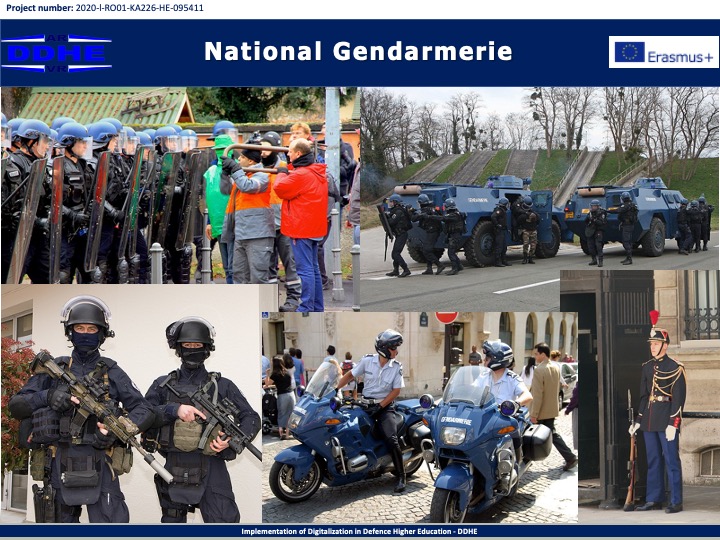
National Gendarmerie
The National Gendarmerie (French: Gendarmerie nationale, [ʒɑ̃daʁməʁi nɑsjɔnal]) is one of two national police forces of France, along with the National Police. The Gendarmerie is a branch of the French Armed Forces placed under the jurisdiction of the Ministry of the Interior, with additional duties from the Ministry of Armed Forces. Its responsibilities include policing smaller towns, suburbs and rural areas, along with special subdivisions like the GSPR. By contrast, the National Police is a civilian law enforcement agency that is in charge of policing cities and larger towns. Because of its military status, the Gendarmerie also fulfills a range of military and defence missions, including having a cybercrime division. The Gendarmerie has a strength of around 102,269 people (as of 2018).
The Gendarmerie is the heir of the Maréchaussée, the oldest police force in France, dating back to the Middle Ages. The Gendarmerie has influenced the culture and traditions of gendarmerie forces around the world, especially in independent countries from the former French colonial empire.
Parachute Units of the National Gendarmerie
· Gendarmerie Départementale (GD) – territorial police force
· Gendarmerie Mobile (GM) – anti-riot unit and counter-terrorism group (GIGN)
· Garde républicaine – republican guard of France
· Gendarmerie des Transports Aériens – airport security force
· Gendarmerie de l'Air – used for Air and Space Force security
· Gendarmerie Maritime – coast guard unit
· Provost Gendarmerie – provides military police services to French Armed Forces personnel in deployments outside France
· Overseas Gendamerie - provides military police services in the French overseas dependencies and territories, as well as to embassies of France abroad
The National Gendarmerie is primarily a military and airborne capable police force which serves as a rural and general purpose police force.
Treść jest rozpowszechniana na licencji Pewne Prawa Zastrzeżone Uznanie Autorstwa Na Tych Samych Warunkach 4.0